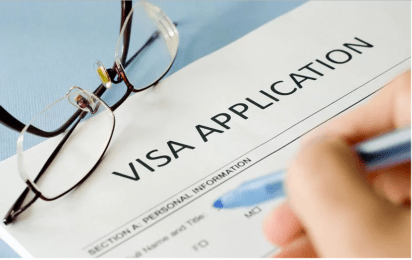With effect from August 29, 2019, Nigerian citizens whose applications for nonimmigrant USA visas in B, F, H1B, I, L, and R visa classifications are approved will be required to pay a visa issuance fee, or reciprocity fee.
The United States of America on Tuesday unveiled new visa reciprocity schedule for Nigerian citizens, saying it is meant to eliminate cost difference. This is coming months after suspending the drop-box, a service that offers interview waivers for visa renewals of certain categories.
Visa class categories of B1, B2, B1/B2, F1 and F2 will pay reciprocity visa fee of $110; H1B and H4 categories will pay $180, I category will pay $210; L1 and L2 will pay $303, while R1 and R2 categories pay $80, according to a statement by the Public Affairs Section (PAS) of the US Consulate General in Lagos on Tuesday.
The reciprocity fee would be charged in addition to the nonimmigrant visa application fee, also known as the MRV fee, which all applicants pay at the time of application. The nonimmigrant visa application fee ranges from $160, $190 and $265 depending on the visa category and is paid at GTBank in Nigeria by the applicant.
The reciprocity fee would be required for all Nigerian citizens worldwide, regardless of where they are applying for a nonimmigrant visa to the United States. The fee is required for each visa that is issued, which means both adults and minors whose visa applications are approved will be charged the reciprocity fee. The fee can only be paid at the US Embassy or the US Consulate General and not at banks or any other location.
The respite, however, is that the new fees will only be paid by Nigerian citizens who are granted visas, while those whose applications are denied would not be charged.
For instance, a Nigerian student applying for an F1 category visa will now be required to pay not only the visa application fee of $160 but also additional reciprocity fee of $110 if the visa is granted.
“U.S. law requires U.S. visa fees and validity periods to be based on the treatment afforded to U.S. citizens by foreign governments, insofar as possible. Visa issuance fees are implemented under the principle of reciprocity: when a foreign government imposes additional visa fees on U.S. citizens, the United States will impose reciprocal fees on citizens of that country for similar types of visas,” the statement said on the rationale for the review.
“Nationals of a number of countries worldwide are currently required to pay this type of fee after their nonimmigrant visa application is approved,” the statement said.
Currently, it costs more for a US citizen to obtain a visa to Nigeria than it costs a Nigerian to obtain a comparable visa to the US. The new reciprocity fee for Nigerian citizens, therefore, is meant to eliminate that cost difference, according to the statement.
Since early 2018, the statement said, the US government has engaged the Nigerian government to change the fees charged to US citizens for certain visa categories.
“After 18 months of review and consultations, the government of Nigeria has not changed its fee structure for U.S. citizen visa applicants, requiring the U.S. Department of State to enact new reciprocity fees in accordance with our visa laws,” it said.
Confirming this, a source at the Ministry of Foreign Affairs told BusinessDay on Tuesday that the US government was merely retaliating the visa fee increase by the Nigerian government in January this year. He, however, lamented that the high fee would be additional burden on poor Nigerians who are travelling for genuine reasons to the US.
Bernard Bankole, president, National Association of Nigerian Travel Agents (NANTA), agreed, saying the US was retaliating what the Ministry of Foreign Affairs was doing to its citizens.
“This is the fault of the Nigerian government. This will only breed more hardship. They do not want Nigerians to travel and they are not providing jobs for people to do here,” Bankole said.
“It is a problem created by our government and it has nothing to do with the US government. The US government has only just done the needful. They reciprocated what we are doing. The effect is just that Nigerians will suffer more and as an import-driven nation, it will only be our loss,” he said.
But another Ministry of Foreign Affairs insider said the visa fee review in January by the Nigerian government was not targeted at US citizens alone, but applied across board because of directive to the ministry to increase revenue.
“I think we should look deeper than what they have said. Before now, they stopped the drop box, they stopped appointments for some time, and also limited the number of appointments,” Ikechi Uko, a travel business consultant and organiser, Akwaaba African Travel Market, said.
“The US is actually redesigning their consular relationship with Nigeria and I think the government of Nigeria needs to wake up to the reality. There are so many things happening around our foreign relations, not just with the US but with many countries. There has to be a well-informed articulation of government policy. There needs to be a lot more robustness in our foreign policy than what is happening now,” Uko said.
Since the news broke on Tuesday, Nigerians have also taken to Twitter blaming the government over the development.
“All these should make the Nigerian government sit up. We need to develop our country so we can one day wake up to something positive happening in Nigeria. After 18 months, Nigeria still couldn’t revise their charge,” @StanleyAleakwe tweeted.
Okey Daniel Onwubalili with Twitter handle @OkechukwuOdan said, “International diplomacy is based on reciprocity. We shouldn’t expect US government to treat us better than our government treat theirs. Also, we shouldn’t expect them to treat us better than our government. FGN ought to have been responsive bearing us in mind. 18 months of frustration is too much.”
Source: businessdayng






